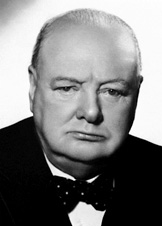
I’m lying down in my bedroom on a cheap mattress with my pencil and pen looking for inspiration in my writing. And my mind wandered to none other than Winston Churchill, one of the great leaders of the 20th Century. He was the prime minister of Great Britain during World War II from 1940-1945 and then served again from 1951-1955. He is known very well for his speeches, some of which are fantastic. He was also a prolific writer and an accomplished painter. It was his writing that made him stand out and in particular some of the specific classic literary techniques that he used. Here are a few examples of how he wove them into his speeches.
Paradox
A paradox is a contradictory, but often revealing, logical anomaly. It is a statement or proposition that seems self-contradictory or absurd but in reality expresses a possible truth.
Churchill said: “…decided only to be undecided, resolved to be irresolute, adamant for drift, solid for fluidity…”
Oxymoron
This is the juxtaposition of contrasting ideas with symmetrical phrasing. It is a figure of speech by which a locution produces an incongruous, seemingly self-contradictory effect.
Churchill said: “…an iron curtain has descended across the Continent.”
Epizeuxis
A figure by which a word is repeated with vehemence or emphasis.
Churchill said: “…this is the lesson: never give in, never give in, never, never, never, never…”
Periphrasis
Circuitously elaborate expression.
Churchill said: “…it cannot in the opinion of His Majesty’s Government be classified as slavery in the extreme acceptance f the word without some risk of terminological inexactitude.”
That last one is my favorite because it seems like that’s how all politicians talk today. These are just a few examples of how Churchill wove classical literary techniques into his speeches and writings. And my favorite speech of all is probably one of his most famous, Their Finest Hour. This speech was delivered on June 18, 1940 to the House of Commons. Here is the final paragraph. I get goosebumps every time I read or hear it.
What General Weygand called the Battle of France is over. I expect that the Battle of Britain is about to begin. Upon this battle depends the survival of Christian civilization. Upon it depends our own British life, and the long continuity of our institutions and our Empire. The whole fury and might of the enemy must very soon be turned on us. Hitler knows that he will have to break us in this Island or lose the war. If we can stand up to him, all Europe may be free and the life of the world may move forward into broad, sunlit uplands. But if we fail, then the whole world, including the United States, including all that we have known and cared for, will sink into the abyss of a new Dark Age made more sinister, and perhaps more protracted, by the lights of perverted science. Let us therefore brace ourselves to our duties, and so bear ourselves that, if the British Empire and its Commonwealth last for a thousand years, men will still say, “This was their finest hour.”